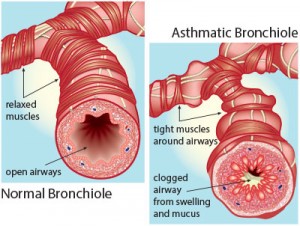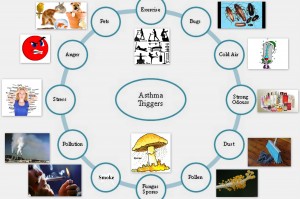Introduction:
Asthma is a syndrome characterized by airflow obstruction possibly due to chronic airway inflammation and increased airway hyper-responsiveness. It is characterized by variable and recurring symptoms, reversible airway obstruction and bronchospasm (sudden constriction of the muscles in the walls of the bronchioles). Common symptoms include wheezing (a continuous coarse whistling sound produced during breathing), coughing, chest tightness and shortness of breath. Asthma is prevalent all over the world in all age groups. It may start in as early as newborns or as late as elderly people. Asthma is largely controllable and to an extent curable, depending on the stage and extent of the disease.
What causes asthma?
Asthma is thought to be caused by a combination of genetic and environmental factors. Several risk factors have been implicated – endogenous factors (factors that originate from within the individual) & environmental factors.
Endogenous factors:
- Genetic Predisposition – There is an increasing evidence that severity of asthma is genetically determined.
- Atopy – Atopy (tendency to be hyper allergic) is a major risk for asthma and non atopic individuals have a very low risk of developing asthma. The allergens that lead to sensitization are usually proteins that have protease activity, and the most common allergens are derived from house dust mites, cat and dog fur, cockroaches, grass and tree pollens, and rodents. Atopy is due to genetically determined production of specific IgE antibody, with many patients showing a family history of allergic diseases.
- Intrinsic Asthma – A minority of asthmatic patients (approximately 10%) have negative skin tests to common inhalant allergens and normal serum concentrations of IgE. These patients with non-atopic or intrinsic asthma commonly have other irrelevant symptoms like nasal polyps and may be aspirin-sensitive. Such patients usually have more severe, persistent asthma.
- Infections – Although viral infections are common as triggers of asthma exacerbations, it is uncertain whether they play a role in the causation of asthma. There is some association between respiratory viral infection in infancy and the development of asthma, but specific pathogenesis is unknown.
- Ethnicity & Obesity – The actual cause is unknown.
Environmental factors –
- Allergens – Inhaled allergens are common triggers of asthma symptoms. Exposure to house dust mites in early childhood is a risk factor for asthma.
- Air pollution – Air pollutants like sulphur dioxide, ozone and diesel particulates may trigger asthma symptoms. Indoor air pollution may be more important with exposure to nitrogen oxides from cooking stoves and exposure to passive cigarette smoke.
- Diet – Observational studies have shown that diets low in antioxidants such as vitamin C and vitamin A, magnesium, selenium and omega-3 polyunsaturated fats (fish oils) or high in sodium and omega-6 polyunsaturates are associated with an increased risk of asthma. Vitamin D deficiency may also predispose to the development of asthma.
- Occupational exposure – Occupational asthma is relatively common and may affect upto 10% of young adults. Chemicals such as toluene diisocyanate and trimellitic anhydride, may lead to sensitization independent of atopy. Individuals may also be exposed to allergens in the workplace such as small animal allergens in laboratory workers and fungal amylase in wheat flour in bakers. Occupational asthma may be suspected when symptoms improve during weekends and holidays.
Triggers involved in asthma – Several stimuli trigger airway narrowing, wheezing and dyspnoea in asthmatic patients. Some of them are –
- Allergens
- Upper respiratory tract viral infections
- Exercise and hyperventilation
- Cold air
- Sulphur dioxide and irritant gases
- Drugs – β-blockers, aspirin
- Stress
- Irritants – household sprays, paint fumes
Signs & Symptoms of Asthma –
Many people do not know they have asthma, especially if their symptoms aren’t severe. But any symptom of asthma is serious and can become deadly.
The most common symptoms of asthma are:
- Coughing, especially at night, with exercise, or when laughing
- Trouble breathing
- A tight feeling in the chest
- Wheezing – a squeaky or whistling sound
- Nasal flaring
- Rapid pulse
- Sweating
- In severe cases bluish discoloration of lips/face
Investigations:
Diagnosis of asthma is usually evident from the symptoms of variable and intermittent airways obstruction. The investigations that are usually done to confirm asthma are as follows:
- Lung function tests
- Airway responsiveness
- Total serum IgE and specific IgE to inhaled allergens (RAST – Radioallergosorbent test)
- Chest X-ray
- High-resolution CT scan
- Skin prick tests to common inhalant allergens
- Exhaled Nitric Oxide measurement
Homoeopathic Approach in treating asthma:
The fundamental problem in asthma appears to be immunological: young children in the early stages of asthma show signs of excessive inflammation in their airways. Homoeopathy looks for the underlying causes of asthma which are: poor resistance to allergens, lowered immunity, genetic predisposition, recurrent infections & colds etc thereby removing the ailment from the root level. Homeopathic medicines help by improving your body’s natural (immune) responses guiding the body back to a healthy state, naturally. There have been many researches made with regards to asthma and homoeopathy and it is a well proven fact that homoeopathy is highly suggested in treating asthma.
Asthma treated in the conventional method is usually with the help of bronchodilators and steroids. They work wonderfully in acute conditions and when immediate relief is expected. Though helpful, you will soon realize that they work only at the level of relieving symptoms and preventing them temporarily. They do not help the body improve its response to allergens (irritants) or simply fail to improve the faulty immune mechanism. Homoeopathy helps in targeting the root cause of the problem and thereby treats the causes of asthma from within. The main aim and objective of Homoeopathy has been to treat a person individually and relieve them of their symptoms from within.
Since it is known that the root cause of most asthmatic patients is their body’s hyper responsiveness to allergens (irritants), it can be easily perceived that this immunological disorder will require a constitutional approach towards its correction. There are also remedies that can be given for the causes of allergic asthma which are specific for the kind of allergy the individual has.
The homoeopathic treatment for asthma is based on an extensive case study of the patient with regards to his/her characteristic symptoms, genetic predisposition, and their mental state. The total time taken for the treatment differs from person to person depending on the duration, intensity and frequency of the suffering, maintaining causes, susceptibility and general health of the patient.
The goal of homoeopathic treatment for asthma is to identify the main cause for the attacks, and then to use the body’s own healing processes to transform the triggers into remedies. Asthma is viewed differently in each person, because each person is afflicted in a different way. The health of the whole body, not just the respiratory system, is addressed. Ultimately, homeopathy might create a cure for the asthma by strengthening and balancing the immune system.
With the help of homoeopathy, the frequency & severity of the asthma attacks can be reduced, the immunity of the individual can be enhanced thereby reducing the recurrences of cold, cough, throat infections etc and the need for bronchodilators and steroids can be minimalized.
It is therefore advisable to choose Homoeopathy for treating your asthma, because it treats the illness from within and removes it at its root level with a long term relief and without any side effects.
How Dr. Neha Seth can help you with your asthma?
Dr. Neha Seth believes in giving the patient immediate relief with a shorter period of treatment. The prime line of treatment is to consider every disease to be a result of an allergy. The patient is first asked to get her Serum IgE levels done. The Serum IgE levels would be high in every patient. To know the allergen that is causing the disease, an allergy test is done. There are two types of allergy tests that are done – a blood test and a skin test. Usually the skin allergy test is asked for; reason being it costs 1/10th the cost of the blood test. With the help of the allergy test, the allergen is identified and treated accordingly. In case of asthma, it could be a food item like nuts, dairy products, eggs, seafood, artificial food colours etc. The patient is immediately asked to stop consuming that food item which is the primary allergen. In case the allergen isn’t a food item and it is rather something like dust, pollen or strong odours etc, then the patient is expected to minimize the exposure as much as possible and keep away from the disease causing allergen. Since the maintaining and the causative factors are now known, homoeopathy works wonderfully once these causes are removed. The patient will therefore experience a reduction in the intensity and frequency of the symptoms as well as tolerance to factors such as pollen, dust etc which trigger asthma attack. Thus, Dr. Neha Seth can help you with your asthma and definitely treat it giving you a long time relief from the breathlessness and allergic attacks.






